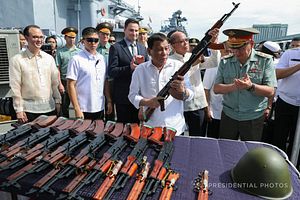The House of Representatives of the Philippines has passed anti-terrorism legislation that will grant the administration of President Rodrigo Duterte broad powers to expand what the United Nations has called a widespread campaign of suppressing dissent.
Duterte is expected to sign the bill, which passed the Senate in February and will allow authorities to detain suspects without charge for up to 24 days, carry out warrantless arrests, and detain people for making social media posts critical of the government.
On Thursday, days after the House approved the legislation, the UN’s human rights office released a report blasting rights abuses under the Duterte administration, including “near impunity” for police in the country’s war on drugs and the practice of “red-tagging” – branding legal dissenters and activists as communists and clearing the way for violent crackdowns.
The anti-terrorism bill will give Duterte, who had certified the bill as urgent, broad leeway to expand these campaigns against his critics.
Duterte, who has long toyed with the idea of placing the Philippines under martial law, will have the authority to appoint an anti-terrorism council that can designate individuals and organizations as terrorists without the approval of courts. This will allow for the warrantless arrest of those labeled terrorists or suspected of being part of a designated group.
The Duterte administration has previously released lists of dissenters it brands as communist rebels, blocked foreign funding of NGOs and organizations critical of the government, and tolerated deadly state operations against indigenous leaders, farmers and land rights activists.
Critics said Congress, which hastened the passage of the bill while blocking all individual amendments at hearings, was “railroading” the democratic process.
“With Duterte controlling all branches of government, a rubber stamp Congress with not a single ounce of legislative independence is already a clear and glaring sign of a dictatorship,” Cristina Palabay, secretary general of human rights watchdog Karapatan, said in a statement.
Palabay accused Duterte of fast-tracking the bill’s passage to secure foreign funding for the government’s counterinsurgency campaigns.
The United States, which has partnered with the Philippines in counterterrorism and counterinsurgency operations for decades, is expected to approve an arms sale to the country despite growing domestic opposition.
Philippine counterinsurgency operations have long been used to target legal activist groups and dissenters, especially in provincial areas, with lethal force. The government maintains it only targets members of the banned New People’s Army (NPA), a communist guerrilla group, but rarely provides evidence to that effect.
Activists are commonly arrested and held without bail on false charges, a process which would be eased should the anti-terrorism bill pass.
Despite widespread condemnation from rights groups, Senate President Vicente Sotto III on Thursday lashed out at critics of the bill, saying only terrorists had anything to be afraid of.
Sotto, a principal author of the bill, insisted protests will not be classified as terrorism. “They should not fall for false propaganda,” he said on Twitter.
Delfin Lorenzana, the country’s secretary of defense, also said the bill contains sufficient human rights protections.
But the bill has been widely interpreted as an effort to target dissenters rather than terrorists.
Proposed amendments that would exclude acts by people due to “political frustration” and protect protests that are planned peacefully but become disorderly were rejected by Atleta Jericho Nograles, the bill’s sponsor.
Nograles also rejected a proposal by Bong Suntay, chairperson of the House committee on human rights, to amend the provision allowing for warrantless arrests. Suntay argued that such arrests violate the country’s constitution.
Antonio Carpio, a retired Supreme Court justice, said Thursday the bill can be challenged in court immediately after its passage due to infringements on freedom of speech and the wider scope for warrantless arrests.
Filipinos have protested the bill both online and in the streets. Progressive groups gathered on Thursday to protest the bill at the University of the Philippines Diliman campus in Quezon City. On Twitter, the hashtag #JunkTerrorBill has trended throughout the week.
As of Thursday evening, the pro-government hashtag #SupportAntiTerrorBill was the top trending topic in the Philippines – but it had been flooded by K-pop fan accounts tweeting messages opposing the bill.

































